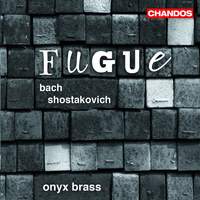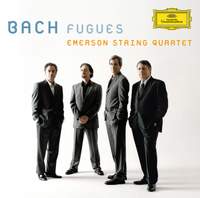Recording of the Week,
Bach Fugues from Onyx and the Emersons
Although the origin of the fugue goes back to the middle ages, it was only in the Baroque era that it became an essential part of composition. The basic idea of a fugue is that it opens with a main theme (known as the subject). As soon as this has finished a second voice enters with the same theme, while the first voice mimics the theme with what is known as counterpoint. The texture gradually builds up as each new voice enters.

Buxtehude and Pachelbel both developed the fugue during the late 17th century, but it was in the hands of Bach during the first half of the 18th century that the form really reached full maturity. His most famous fugues are from the Well-Tempered Clavier – comprising two volumes written at opposite ends of Bach’s life, and each containing 24 prelude and fugue pairs.
Although almost all Bach’s Fugues were originally written for keyboard instruments their musical content is of such high quality that you quite often hear them arranged for different forces. One benefit of this is that separate instruments can make it easier for listeners to hear the various voices and the way the statements of the subject and countersubject are interwoven.
Two such groups to have tackled some of these fugues recently are the Emerson String Quartet and Onyx Brass Quintet.
From a performing perspective it creates a whole set of new challenges. Since they are all playing the same thematic material, it is vital that the players achieve similarity or unanimity of style and approach. I’m very pleased to say that both groups rise to the challenge superbly.
The Emersons, following their previous success with The Art of Fugue, succeed in bringing both beauty and intelligence to their performances. This, combined with their careful attention to phrasing and natural warm tone, makes a winning combination.
Onyx’s disc is in many ways the more interesting as they contrast each Bach fugue with one in the matching key by Shostakovich. The Russian composer’s 24 Preludes and Fugues were written following his visit to Leipzig for the bi-centenary celebrations of Bach’s death, and while technically harder than the Bach, they sound stunning played by a quintet of this quality.
Much to enjoy on both these discs, and as usual there are samples to whet your appetite below.
Available Formats: MP3, FLAC
Available Formats: MP3, FLAC




